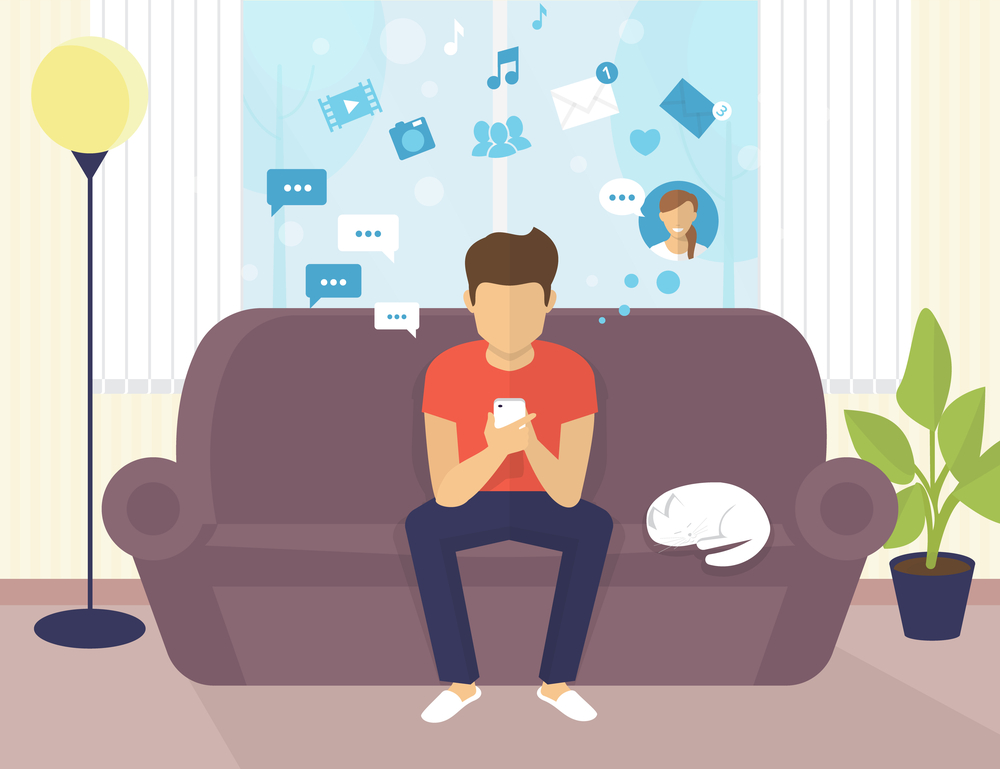New research suggests parents should manage their own fears, not their children’s. While social media isn’t perfect, teenagers need autonomy to make their own decisions
I have four children, two of which are teenage boys. Recently, I have become increasingly aware of how glued they are to their screens, particularly the 14-year-old. He seems to feel his online presence is as important – if not more important – than his real-life flesh world.

Sometimes his addiction to social media feels off-putting. Why does he only feel valid on Snapchat? Yet it seems almost impossible to police it. Short of turning off the WiFi, how do I patrol what my teens are doing online?
This is a subject that has become a hot topic for parents and the arguments around this issue can divide families and cause seemingly irreparable rifts.
I see this as a parent, but also as a counsellor, both in my private practice and with the teenagers I see at No5 Youth Counselling Centre in Reading. Parents find their teens’ online behaviour, at best, hard to fathom. At worst, they are convinced their teens are up to no good – sexting, looking up the “wrong” stuff, communicating with strangers on a variety of mysterious apps, or shaming others or being shamed themselves.
It’s a difficult new world. I often feel torn between two positions as a counsellor who unconditionally holds clients with positive regard, but then also as a concerned parent. It’s in these two roles that I have had to find that middle space, a space I can inhabit in a way that makes me feel unworried and yet concerned, and I have come to truly understand what autonomy means for a modern teenager.
My teenage clients hate the assumption made by many a caring and worried parent that they are “up to no good”. In fact, the adjective “misunderstood” does seem to be the way that most teens feel today.
New research suggests that sexting is misunderstood by parents, and that teenagers have worked out a moral code of their own
My question is: are we, the parents, the problem? There is a great deal of fear surrounding teens and their use of social media. And that usage preys on our minds because it is the Great Unknown, the dark mass, or, as Jung would name it, “the shadow”.
Parents fear many things. We all desperately want to keep our children physically and mentally healthy. Yet the teenage clients who come to see me often feel that they have not been given the “right” to self-govern.
None of them – not in my private practice or at No5 – come in with issues surrounding social media. In fact, many of these teenagers find an online life a source of reassurance in difficult times.
So, given my experience as a counsellor and listening to my clients, many of whom felt that their parents – quite wrongly in their eyes – didn’t trust them, I recently made the decision to stop becoming overly concerned about my children’s use of social media. I now refuse to snoop on their online activity.
For me, monitoring my children’s internet use is akin to reading their diaries: I am not sure if I really want to know everything they are getting up to. I have decided that there are many ways to tell if something untoward is going on. Has your child’s behaviour changed? For instance, has a formerly sociable child turned very anti-social? We often want to invade out teens’ lives but we have to accept that we can’t. Hopefully we feel we have brought them up to be able to make some decisions themselves and turn to us if things go wrong.

The teenagers I see find their parents’ anxiety about their lives very hard to bear. It makes them feel panicked, anxious and nervous.
This is highlighted in a new book that looks at how anxious parents are “creating a moral panic” over social media. The book, Invisibly Blighted; The Digital Erosion of Childhood, written by academics from University College London and Plymouth University Business School, suggests that parents react to their children’s use of social media in a disproportionate way, and that the effect of reaction is to cause anxiety in their teenagers.
And there’s more. The authors’ research says that sexting is misunderstood by parents and that teenagers have worked out a moral code of their own. Indeed, they do understand what consent means, and they are respectful – in their own way – of each other. It is the trust between the parent and child that makes the difference.
Teenagers need the autonomy to make their own decisions. I am always there (in the background) for my children if they need me – maybe sometimes decisions might prove to be a bit more difficult than they can handle. Also, as I have brought my 14-year-old boy up, it would feel counter-productive not to give him some sort of trust. It would imply that I don’t really believe I’ve done an OK job. And it would seem to erode his growing sense of self to be constantly haranguing and monitoring him.
The main parental issue – aside from our free-floating fear of the internet – is one of communication.
In order to understand the world of the teenager, we need to be invited in to it, even if it is only in a small way. The only way to achieve this is to communicate.
If I endlessly monitor my son, I am actually infantilising him. I would be implying that he has no real ability to know what’s right from wrong or to be able to make proper decisions about
his world.
Parents often suffer from this free-floating sense of fear, dread and panic about something that is very difficult to control. Part of the reason is that we don’t really understand social media, certainly not in the way our teenagers do. This means it has taken on a terrible place is our psyche – we get overwhelmingly paranoid that something dreadful or threatening is going on with our teenagers on one of their social platforms. And yet, generally speaking, this is not true. The way teenagers use social media is very different to the way we use it as adults.

I have seen many clients aged between 11 and 24, and they have brought a whole range of issues with them from anxiety and depression, to eating disorders and self harm. Not one of them has brought issues with social media in to the room.
In fact, in most cases, going online has been a source of support. The client that is questioning their sexuality can be massively helped by an online support system that makes her or him feel less alone and less rejected. I have had clients for whom being part of a chatroom about self-harm or eating disorders or suicide ideation has actually kept them far more together than if they had no access to that network. To put things simply, they feel these online communities understand them.
So, the thing to do as parents is to manage our own fears.
I am not sure our children are in any more danger than we were when we were teenagers. Bullies are bullies. They exist throughout society, and I certainly suffered from that as a child. There was no internet back then, but the same feelings of shame, hurt or fear existed. Maybe if there had been an internet, I could have gone online and found a bit more support than my nearest-and-dearests were able to offer.
Lucy Cavendish is a BACP-registered Integrative Counsellor. For more information please go to lucycavendishcounselling.com. Visit Counselling Directory to find a professional in your area.


Comments